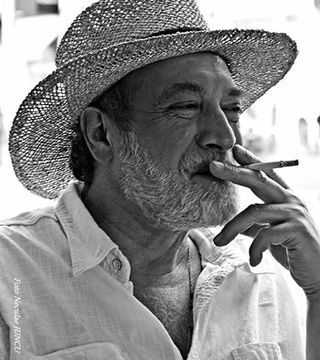
Leonard Oprea is a Romanian novelist, poet, and essayist. In the late 1980s, he wrote two books of fiction that were banned by the Communist regime and gained him repute among dissidents. Following the 1989 Revolution, the books were published but did not attract significant notice during the political upheaval of the time. He left Romania for the United States in 1999, after which the pair of previously banned works was once again released. In the 2000s, he wrote the fictional series Theophil Magus, and by 2020 this series included 17 separate titles. Piero Scaruffi considers his work "Cele Nouă Învățături ale lui Theophil Magus despre Magia Transilvană/ The Nine Teachings Of Theophil Magus On Transylvanian Magic" (2000) among the ten best novels in the Romanian language.

Doina Ruști is a Romanian writer and novelist.
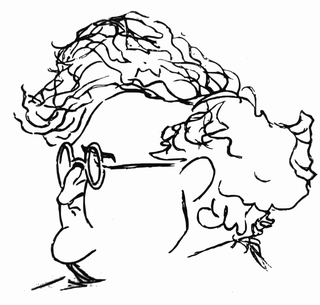
Perpessicius was a Romanian literary historian and critic, poet, essayist and fiction writer. One of the prominent literary chroniclers of the Romanian interwar period, he stood apart in his generation for having thrown his support behind the modernist and avant-garde currents of Romanian literature. As a theorist, Perpessicius merged the tenets of Symbolism with the pragmatic conservative principles of the 19th century Junimea society, but was much-criticized over perceptions that, in the name of aesthetic relativism, he tolerated literary failure. Also known as an anthologist, biographer, museologist, folklorist and book publisher, he was, together with George Călinescu, one of his generation's best-known researchers to have focused on the work of Junimist author and since-acknowledged national poet Mihai Eminescu. Much of Perpessicius' career was dedicated to collecting, structuring and interpreting Eminescu's texts, resulting in an authoritative edition of Eminescu's writings, the 17-volume Opere ("Works").

Dumitru Țepeneag is a contemporary Romanian novelist, essayist, short story writer and translator, who currently resides in France. He was one of the founding members of the Oniric group, and a theoretician of the Onirist trend in Romanian literature, while becoming noted for his activities as a dissident. In 1975, the Communist regime stripped him of his citizenship. He settled down in Paris, where he was a leading figure of the Romanian exile.
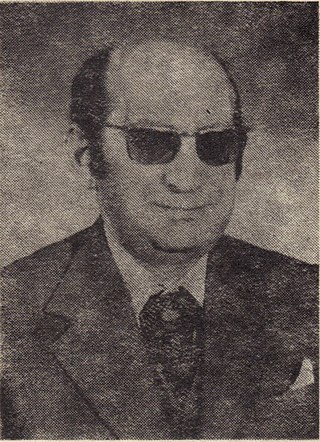
Zigu Ornea was a Romanian cultural historian, literary critic, biographer and book publisher. The author of several monographs focusing on the evolution of Romanian culture in general and Romanian literature in particular, he chronicled the debates and meeting points between conservatism, nationalism, and socialism. His main early works are primarily dedicated to the 19th and early 20th century cultural and political currents heralded by Junimea, by the left-wing ideologues of Poporanism and by the Sămănătorul circle, followed independently or in relation to one another. Written as expansions of this study were Ornea's biographical essays on some of the period's leading theorists: Titu Maiorescu, Constantin Dobrogeanu-Gherea and Constantin Stere.

Felix Aderca, also known as F. Aderca, Zelicu Froim Adercu or Froim Aderca, was a Romanian novelist, playwright, poet, journalist and critic, noted as a representative of rebellious modernism in the context of Romanian literature. As a member of the Sburătorul circle and close friend of its founder Eugen Lovinescu, Aderca promoted the ideas of literary innovation, cosmopolitanism and art for art's sake, reacting against the growth of traditionalist currents. His diverse works of fiction, noted as adaptations of Expressionist techniques over conventional narratives, range from psychological and biographical novels to pioneering fantasy and science fiction writings, and also include a sizable contribution to erotic literature.

Ștefan Aurel Baciu was a Romanian and Brazilian poet, novelist, publicist and academic who lived his later life in Hawaii. A precocious, award-winning, young author in interwar Romania, he was involved in editing several literary magazines. Attracted into left-wing democratic politics and the Social Democratic Party (PSDR), he camouflaged his views while working for the fascist press under dictatorial regimes, but returned in 1944 to manage the PSDR's Libertatea newspaper. Witnessing first-hand the gradual communist takeover, Baciu managed to have himself assigned to a diplomatic posting in Switzerland, and ultimately defected in 1948. A resident and then citizen of Brazil, and a traveler throughout Latin America, he wrote works in Portuguese, Spanish, English and German, as well as in his native Romanian.

Paul Georgescu was a Romanian literary critic, journalist, fiction writer and communist political figure. Remembered as both a main participant in the imposition of Socialist Realism in its Romanian form and a patron of dissenting modernist and postmodern literature, he began his career in politics during World War II, when he sided with the anti-fascist groups and the underground Romanian Communist Party in opposition to the Axis-aligned Ion Antonescu regime. During the first twenty years of Communist Romania, Georgescu assisted Leonte Răutu in exercising Stalinist control over local literature, but also published young nonconformist authors, beginning with Nichita Stănescu and Matei Călinescu, in his Gazeta Literară. Sidelined over his own incompatibility with the Socialist Realist dogma, and returning to public life during the 1960s liberalization enforced by Nicolae Ceaușescu, he became openly adverse to Ceaușescu's variety of national communism and clandestinely cultivated the prohibited ideology of Trotskyism.
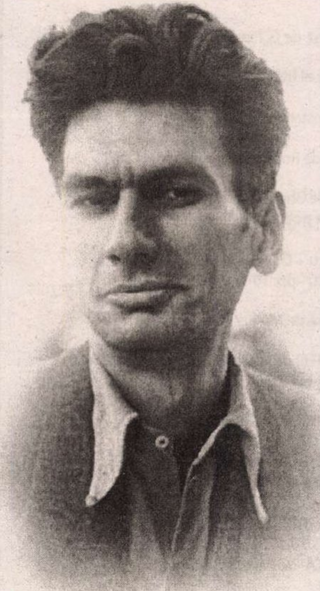
Constant Tonegaru was a Romanian avant-garde and Decadent poet, who ended his career as a political prisoner and victim of the communist regime. Known for his bohemianism, he was the author of celebrated escapist and individualist poems, characteristic for the World War II generation in Romanian literature, and closely related to the works of his friends Geo Dumitrescu, Dimitrie Stelaru, and Ion Caraion. Together with them, Tonegaru stands for one of the last waves to pass through Sburătorul, a modernist literary society formed around literary critic Eugen Lovinescu.

Dan Lungu is a Romanian novelist, short story writer, poet and dramatist, also known as a literary theorist and sociologist. The recipient of critical acclaim for his short story volume Cheta la flegmă and his novels Raiul găinilor and Sînt o babă comunistă!, he is also one of the most successful authors to have emerged in post-1990 Romanian literature. Lungu's literary universe, which mainly comprises "microsocial" images of life under the communist regime and during the subsequent transitional period, bridges a form of Neorealism with Postmodernism. Often included among a group of authors who signed their first major contracts with Polirom publishing house, he is also seen as a distinctive voice from his adoptive provincial city of Iași.

Mircea Nedelciu was a Romanian short-story writer, novelist, essayist and literary critic, one of the leading exponents of the Optzeciști generation in Romanian letters. The author of experimental prose, mixing elements of conventional narratives with autofiction, textuality, intertextuality and, in some cases, fantasy, he placed his work at the meeting point between Postmodernism and a minimalist form of Neorealism. This approach is illustrated by his volumes of stories and his novels Zmeura de cîmpie, Tratament fabulatoriu, and by Femeia în roșu, a collaborative fiction piece written together with Adriana Babeți and Mircea Mihăieș.
Horia-Răzvan Gârbea or Gîrbea is a Romanian playwright, poet, essayist, novelist and critic, also known as an academic, engineer and journalist. Known for his work in experimental theater and his Postmodernist contributions to Romanian literature, he is a member of the Writers' Union of Romania (USR), its public relations executive and the head of its Bucharest chapter. Also recognized for his contribution to Romanian humor and his essays, he has published regularly in journals such as Contemporanul, Luceafărul, Ramuri, and Săptămâna Financiară. His career in the media also covers screenwriting for Romanian television stations and the popularization of contract bridge. The author of several scientific works on engineering, Gârbea is also a faculty member at the University of Agronomical Sciences and Veterinary Medicine.
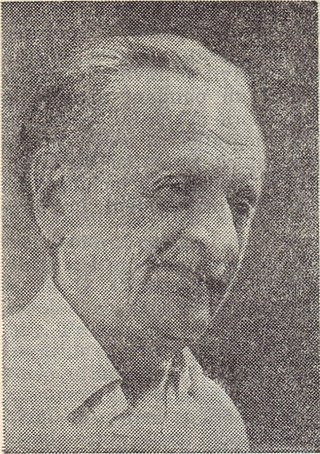
Șerban Cioculescu was a Romanian literary critic, literary historian and columnist, who held teaching positions in Romanian literature at the University of Iași and the University of Bucharest, as well as membership of the Romanian Academy and chairmanship of its Library. Often described as one of the most representative Romanian critics of the interwar period, he took part in the cultural debates of the age, and, as a left-wing sympathizer who supported secularism, was involved in extended polemics with the traditionalist, far right and nationalist press venues. From early on in his career, Cioculescu was also noted for his selective approach to literary modernism and the avant-garde, preferring to place his cultural references with Neoclassicism.
Dinu Nicodin was a Romanian writer affiliated with the modernist venue Sburătorul. Having an aristocratic (boyar) background, he was an eccentric and adventurous figure who only turned to literature as a hobby, and whose scattered works were generally well received by critics during his lifetime. Nicodin was a promoter of works by his younger colleagues, and cultivated close friendships with those of his generation, being primarily noted for his presence on the interwar's social scene.
Cuvântul was a literary and political monthly, published in Bucharest, Romania. Tracing its origins back to 1990, it was successively edited by various figures in contemporary Romanian literature, among them Ioan T. Morar, Ioan Buduca, Radu G. Țeposu and Mircea Martin. Between 2008 and 2009, its editor in chief was literary critic Paul Cernat.
Sesto Pals, pen name of SimionȘestopali, was a Russian-born Romanian and Israeli writer. Primarily a poet-philosopher, he also earned recognition as a graphic artist. He first became known in his teenage years, when, as a friend and associate of Gherasim Luca, he put out the review Alge. Its avant-garde aesthetics and its testing of censorship resulted in their prosecution. While Luca endured as a public intellectual and a founder of the Romanian surrealist cell, Pals became a recluse.

Paul Zarifopol was a Romanian literary and social critic, essayist, and literary historian. The scion of an aristocratic family, formally trained in both philology and the sociology of literature, he emerged in the 1910s as a rebel, highly distinctive, voice among the Romanian press and book reviewers. He was a confidant and publisher of the Romanian writer Ion Luca Caragiale, building his theories on Caragiale's already trenchant appraisals of Romanian society and culture. Zarifopol defended art for art's sake even against the Marxism of his father-in-law, Constantin Dobrogeanu-Gherea, and the Poporanism of his friend, Garabet Ibrăileanu. He was also a noted censurer of neoclassical trends, of philistinism, and of inauthentic customs, advocating renewal, but not revolution. A skeptic reviewer of modernist literature, he reemerged during the interwar period as its dedicated promoter, but his preference for literary entertainment over substance and many of his literary bets were shortly dismissed by other experts of the day.
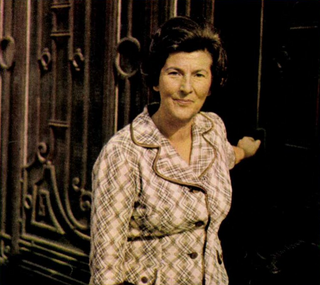
Zoe Dumitrescu-Bușulenga was a Romanian comparatist and essayist. A native of the national capital Bucharest, she was educated at its main university, going on to become a professor there. Together with a focus on interdisciplinary studies, she was noted for devoting several studies to Mihai Eminescu. Meanwhile, Dumitrescu was a dignitary of the Romanian Communist Party. Following the Romanian Revolution, after several years spent in Rome, she retired to a monastery.

Ștefana Velisar Teodoreanu was a Romanian novelist, poet and translator, wife of the writer Ionel Teodoreanu. Encouraged to write by her husband, she was a late representative of Poporanist traditionalism, which she infused with moral themes from Romanian Orthodoxy, and also with echos of modernist literature. Her works of youth, coinciding with World War II, comprise mainly novels centered on the internal conflicts and moral triumphs of provincial women such as herself. Forming a counterpart to her husband's own books, they won praise in their day, but were later criticized for being idyllic and didactic.

Ileana Mălăncioiu is a contemporary Romanian poet, essayist, journalist, dissident, and activist. She has been a corresponding member of the Romanian Academy since 2013.














